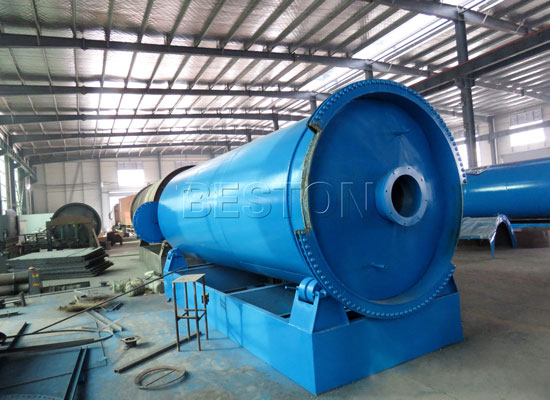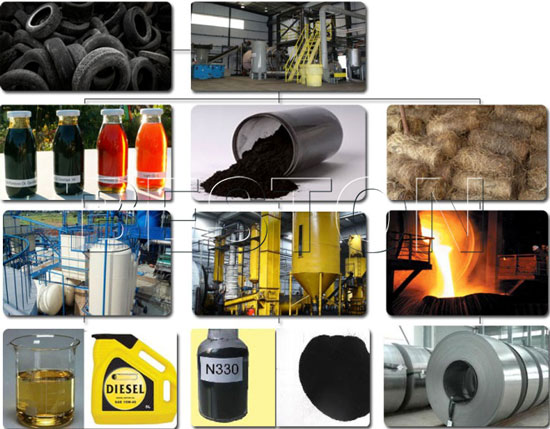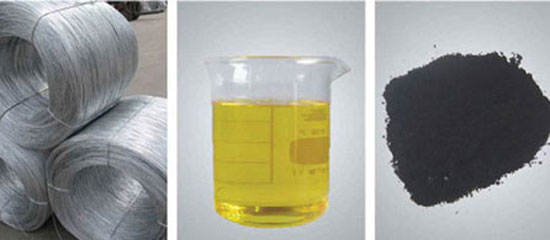Tyres recycling plant is invented to help people turn waste tyres into useful end-products, such as tyre oil, carbon black, steel wire. Maybe you have ever heard of this plant, but how much do you know about the tyre pyrolysis recycling working process and the applications of carbon black from tyre pyrolysis?

1. Feeding the waste tyres into the reactor by manual or auto feeder, then fire the fuel to heat the reactor.
2. After the temperature increase to relevant degree, the oil gas will be generated and enter the gas separator. Here, the heavy components will be liquefied and drop into the heavy oil tank. And light oil gas will rise into the oil condenser being liquefied and get into the oil tank.
3. The unliquefied combustible gas enters the hydroseal. After desulfuration and purification, one part of the gas will be recycled to heat the reactor, and another part will be burnt out to reduce the pressure while the pressure is too high.
4. After finishing oil production, the temperature of the reactor will be cooled down. When the temperature falls down to 40℃, we can discharge the carbon black and steel wire. Generally, we can get about 45% tyre oil, 35% carbon black, 12% steel wire and 8% combustible gas from the tyre recycling plant.

All of the final products have a wide range of applications:
The tyre oil can be widely used as fuel oil in industries such as steel and iron and boiler factories, ceramics, power or chemical industries or hotels, restaurants etc. If further refined to diesel, it can be used in low speed engines, such as digging machine, road roller, loading machine and so on.
The carbon black from waste tyres can be used for construction bricks with clay; attach heavy metal; improve the quality of soil; also can be used to make carbon black bars by using the carbon black pellet machine; used as fuel; or grinding to increase the mesh of carbon black to make new tire, painting etc; if further reprocess the carbon black from waste tyre pyrolysis, its value will be added and fetch higher price in the market.
The steel wire can be recycled into smelting plant to produce new steel products.

| Item | Details | |||||
| Model | BLJ-6 | BLJ-10 | BLL-16 | BLL-30 | BLL-40 | BLL-50 |
| Daily capacity | 6T | 10T | 20T | 30T | 40T | 50T |
| Working method | Batch | Semi-continuous | Fully continuous | |||
| Raw materials | Waste tire, plastic, rubber, oil sludge, medical waste | |||||
| Reactor size | D2.2*L 5.1m | D2.8*L6.2 m | D2.8 *L7.1 m | L12.5*W2.2*H2.5m | ||
| Pattern | Horizontal & rotary | Not rotary type | ||||
| Heating materials | Charcoal, wood, fuel oil, natural gas, LPG, etc. | |||||
| Total power | 24 kw/h | 30 kw/h | 54 kw/h | 53.6kw/h | 62kw/h | 84kw/h |
| Floor area (L*W*H) | 20*10*10 m | 25*15*10 m | 25*15*10 m | 20*15*10m | 33*15*10m | 33*15*10m |
| Operating pressure | Normal pressure | Constant pressure | ||||
| Cooling method | Water cooling | |||||
| Service life | 5-8 years | |||||

